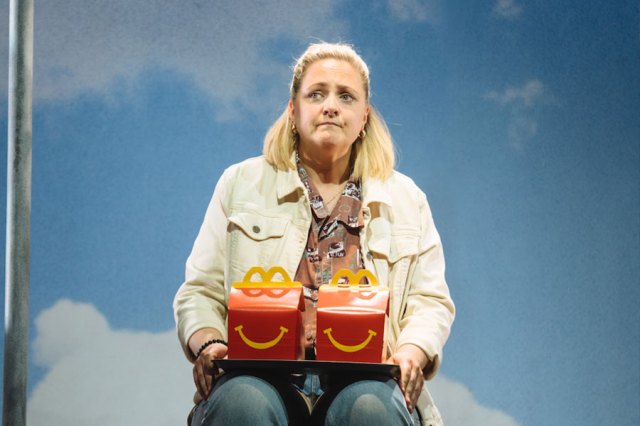Hope Has A Happy Meal review – fast food for thought that loses its pace
The Royal Court premieres the new play

Tom Fowler has cooked up a satirical allegorical quest of a play, where a collection of rag-tag characters struggle to survive in the People’s Republic of Koka Kola (the PRKK) a post-democratic country now in the full throes of hyper-capitalism and run by corporate giants (the head of the country is a CEO). But the piece also loses its way just as the main character, Hope, starts to find hers.
There is much to like, especially Naomi Dawson’s design with its seedy world of dilapidated bars, and faded haphazard military uniforms, reminiscent of post-communist countries. Hope, a humour-filled Laura Checkley (who is rocking it) lands in the PRKK after a 24-year gap. She’s a sort of Kerry Mucklowe from My Country but less of a bumpkin. Unable to contact her estranged sister Lor (Amaka Okafor), she meets Isla (Mary Malone) a transgender waitress. These sweet scenes are mined for their innocence by the actors but the darkness in both characters soon shows – Isla’s dangerous relationship with her sister’s ex, a deranged gun-wielding cop Wayne (Felix Scott), dominates the narrative, whilst the real reason for Hope’s visit is something she represses. Wayne’s behaviour forces the two women to go on the run to find Lor and along the way, Hope and Isla pick up Ali (played with gentle concern by Nima Taleghani) who has lost faith in humanity and himself.
This loss of hope is a main concern. But the play trips up a bit over its second – dysfunctional family relationships. Until now, the action is slick, and terse, with fast-moving elliptical scenes. But someone drags on a table and suddenly the conflict scenes between Hope and Lor slow down – as if the play has to now get serious. The crossing of every t and dotting of every i in the exploration of the sisters’ conflict, makes it lag. Of course, it is a genre change from dark surrealism to almost hyperrealism as it gets to the heart of the play – but if these scenes received the same amount of economical editing as the rest, the play would be none the worse.
Despite the details of the post-democratic corporate country being too light, it’s still pleasing. It’s just that such an environment needs to have a greater impact on the life decisions made by the characters. The characters’ lives change forever at the end of the show, but this is less to do with corporate cruelty and more to do with dysfunctional personalities.
Yet, the show is still a theatrical spectacle. Director Lucy Morrison’s clever transitions between scenes are deeply satisfying, Hope’s role as an enabler carrying everyone else’s burdens as well as her own frustrates and saddens us. Fowler’s writing zips off the page and this talented ensemble group love and revel in it. And it is impossible not to be gunning for Hope – we hope that she finds what she is looking for – which is of course – herself.















